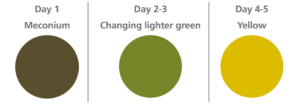Newborn Stools and Urine
Babies need their nappies changed a lot. Their skin is very soft, so you need to change it right after they wee or poo. This keeps their skin from getting red and sore or causing nappy rash. Small babies might need up to 10 or 12 changes a day. Older babies need around 6 to 8 changes.
Talk to your baby while you change them. Make funny faces and laugh. It makes both of you feel good and it’s good for your baby’s development.
Your baby’s wee:
In the first days after birth, your baby might not wee much. Here’s what to look for to know your baby is weeing enough:
- First day: Look for 1 wet nappy.
- Second day: Look for 2 wet nappies.
- Third day: Look for 3 wet nappies.
- By the fifth day, your baby should have about 6 or more wet nappies a day.
Your baby’s poo:
- First Baby Poo – Your baby’s first poo is different. It’s sticky and looks greenish-black. It’s called meconium. Some babies might poo this way right after they’re born or within the first 2 days.
- Poo After A Few Days – The poo will look different after some days. If you breastfeed your baby, the poo will be yellow and runny with little smell. If you use formula, the poo might be darker brown, thicker, and have a stronger smell. Sometimes formula can turn the poo green. If you switch from breastfeeding to formula, the poo will look more like a paste.

How often babies poo?
- In the first week: About 4 times a day.
- By one year old: About 2 times a day.
Breastfed newborns might poo every time they eat, especially early on. After 6 weeks, they might not poo for many days. Formula-fed newborns might poo up to 5 times a day. But, after a few months, it might be once a day.
It’s okay if your baby pushes hard or cries when they poo. Don’t worry if their poo is soft, it doesn’t mean they are sick.
Your baby’s poo can look different from day to day but if it changes a lot, like becoming very smelly, very watery, or hard (especially with blood), it’s good to talk to your GP doctor or health visitor. If your baby’s poo is pale, it can mean there might be a problem with their liver. If you see this, tell your health visitor or GP doctor.

